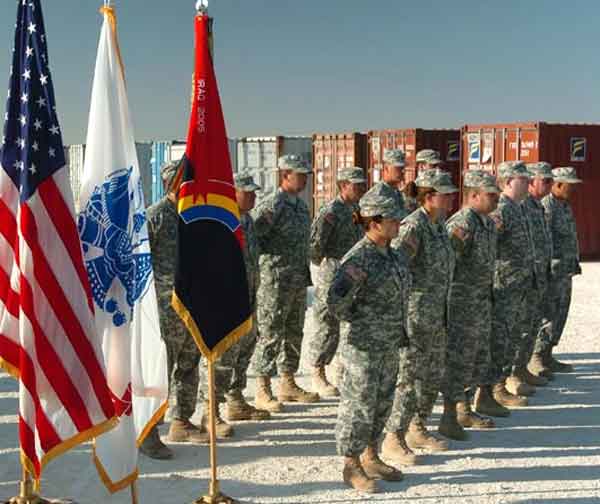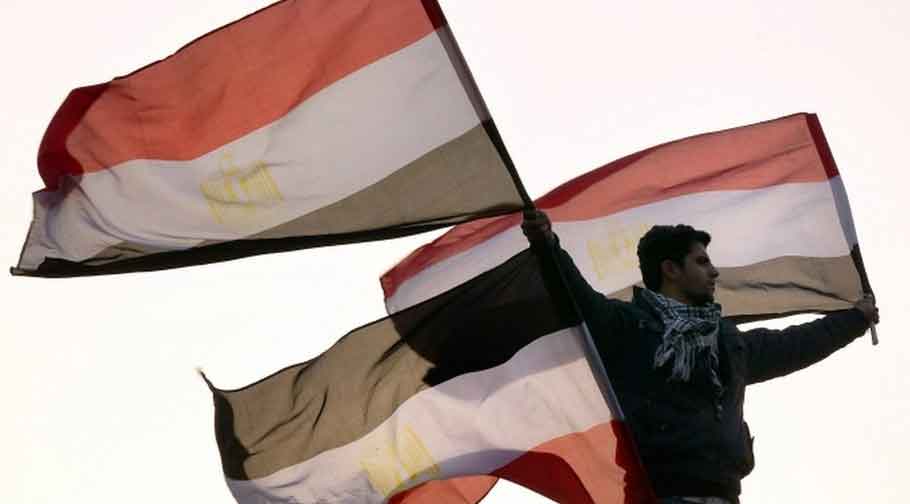By Richard Weitz

Further contacts between the U.S. and Egyptian armed forces
arise from their joint participation in combined military exercises.
The best known of these, the Egyptian-hosted Operation Bright Star exercise,
is the largest multilateral military exercise in the Middle East and occurs every other year.
Photo Credit : Soldiers of the Army National Guard's 42nd Infantry Division
renew their enlistment vows while deployed to Cairo, Egypt
in support of the 2007 Bright Star exercise Nov. 12, 2007,
http://dmna.state.ny.us
02/07/2011 – Perhaps the main tool of influence available to the United States in the current crisis in Egypt is the decades-long relationship that Washington has cultivated with that country’s military and intelligence services. The recent experience reminds us that military-to-military relationships have important diplomatic and security functions when pursued with friendly nations.
Perhaps the main tool of influence available to the United States in the current crisis in Egypt is the decades-long relationship that Washington has cultivated with that country’s military and intelligence services. The recent experience reminds us that military-to-military relationships have important diplomatic and security functions when pursued with friendly nations.

Egyptian-U.S. security ties originated during the presidency of Anwar Sadat, himself a former military officer. After assuming power in October 1970, Sadat spent several frustrating years trying to secure enough military assistance from the Soviet Union to enable the Egyptian armed forces to perform sufficiently well to revenge Israel’s rout of the Egyptian military in the Six-Day War. During that June 1967 campaign, which resulted in Israel’s capture of the Sinai Desert from Egypt as well as the Golan Heights from Syria and the West Bank, the Gaza Strip, and East Jerusalem from Jordan, Israel conducted perhaps the most effective preemptive air strike in history, destroying Egypt’s warplanes on their runways in the opening hours of the campaign.
Under Sadat’s leadership, Egypt defected from the Soviet camp soon after the October 1973 war with Israel (known as the October, Ramadan, or Yom Kippur War), in which the Egyptian army restored Arab pride by initially defeating the Israeli military and recapturing parts of the Sinai. Sadat then worked with Washington to travel to Jerusalem in November 1977, negotiate a peace settlement at Camp David in September 1978, and then sign a peace treaty with Israel in Washington on March 26, 1979. Under its terms, Israel returned all of the Sinai Peninsula to Egyptian sovereignty and guaranteed Israel’s freedom of navigation through the Suez Canal and other international waterways under Egyptian control. In return, Egypt became the first Arab country to recognize the state of Israel.
Following the Soviet invasion of Afghanistan in December 1979, the Egyptian and U.S. governments cooperated to counter what they both feared was the growing threat of Soviet-led influence in their region.
For example, the two intelligence communities collaborated to transfer weapons to the Mujahideen fighters resisting the Soviet occupation of Afghanistan. Although Islamist terrorists assassinated Sadat in October 1981, his successor, Hosni Mubarak, continued the close security relationship with the United States.
For instance, the two countries’ intelligence and military services jointly countered Libyan influence in Sudan and other African countries. After Saddam Hussein invaded and annexed Kuwait in August 1990, Mubarak assumed a lead role in mobilizing Arab support behind the subsequent coalition campaign under Operation Desert Shield/Desert Storm to drive Iraqi forces out of Kuwait. He was rewarded after the conflict when his foreign allies forgave billions of dollars of Egypt’s debt.
There is some concern that a new Egyptian government — especially one under the influence of the Egyptian Muslim Brotherhood, which has always opposed the peace agreement — could renege on the 1979 settlement. Many Egyptians dislike the peace deal because it resulted in their alienation from many other Arab countries (including a decade-long suspension from the Arab League from 1979-89) and because they believe Israeli governments have failed to honor their commitments to make peace with the Palestinians.
Yet, the Egyptian military leadership is perhaps the one important group in Egypt that supports the treaty since it has freed them from having to prepare for war with the strongest military force in the Middle East.
Any Egyptian government would also have economic reasons to adhere to the agreement since, under its terms, Egypt can earn revenue from the oil produced in the Suez, significant fees from international transits through the Suez Canal, and tourist revenue from foreign use of the Sinai reorts.
All three of these sources of income would be at risk if Egyptian-Israeli fighting resumed, though perhaps not if the relationship simply deteriorated to that of a “Cold Peace.”
The newly appointed Egyptian Vice President, Omar Suleiman, has been in charge of managing Egypt’s intelligence cooperation with Israel and the United States. A recent priority of the three governments has been to curb arms smuggling into the Hamas-run Gaza Strip along the Philadelphi corridor connecting Egypt and Gaza. All three governments have considered Hamas and the other militant groups active in Gaza as a common threat.
Before the December 2008 War, the movement’s armed wing used weapons smuggled through the intricate network of tunnels extending into Egyptian territory to launch ever-deeper attacks against Israelis as well as suppress opposition to its authority in Gaza itself. Egypt tried but failed to moderate this behavior and achieve a de facto settlement between Hamas and Israel. The failure of Hamas to heed Egyptian mediation efforts resulted in Israel’s military occupation of Gaza in early 2009.
Even an Egyptian government willing to respect the 1979 peace agreement could find it more difficult than Mubarak to use force against the Palestinians to keep the peace accord, as Mubarak did when he closed the smuggling routes and blocked international efforts to break Israel’s blockade of Gaza by moving goods through Egypt.
Although Israel is likely to react to current situation by adopting an even sterner stance and hunkering down to hedge against increased tensions with Egypt, Israel could ease pressure on the new Egyptian authorities as well as the other moderate regimes in the Middle East, especially Jordan, by helping to make more progress in their negotiating with the Palestinians.
Following the Egypt-Israel peace treaty, the U.S. military aid to Egypt dramatically increased to $1.3 billion annually. Through various Foreign Military Financing programs, the United States has supplied Egypt with F-4 aircraft and F-16 jet fighters, M-60A3 and M1A1 tanks, armored personnel carriers, Apache helicopters, anti-aircraft missile batteries, aerial surveillance aircraft, and other equipment. The Egyptian military receives additional U.S. military equipment through the Excess Defense Articles program.
The U.S. Office of Military Cooperation – Egypt, based in Cairo, helps Egyptian Land Forces secure and use U.S. training and assistance. In addition, hundreds of Egyptian officers receive education and training in the United States each year, mostly through the International Military Education Programs. Retired Maj. Gen. Robert Scales, the former commandant of the US Army War College, recalls that since the early 1980s, Egypt “started sending a great many of their best and brightest to our schools.” By Scales’ reckoning, many of these Egyptian officers trained at U.S. war colleges have now become generals.
Further contacts between the U.S. and Egyptian armed forces arise from their joint participation in combined military exercises. The best known of these, the Egyptian-hosted Operation Bright Star exercise, is the largest multilateral military exercise in the Middle East and occurs every other year. “Eagle Salute” and other exercises and training programs also aim to deepen interoperability between the two militaries.
The government of Egypt has in turn provided important help to the Pentagon. For example, Egyptian authorities grant U.S. military aircraft with over-flight rights and expedited processing for U.S. Navy ships to transit the Suez Canal. Furthermore, U.S. Navy personnel are allowed to make rest and recreation stops at Egyptian ports.
Egyptian and U.S. intelligence cooperation is also extensive if less openly discussed. Some percentage of U.S. aid has supported building Egyptian intelligence capabilities, including elements within both the Egyptian military and the country’s internal security force. Egyptian and U.S. intelligence agencies have collaborated to counter Islamist extremist movements within Egypt as well as elsewhere in the Middle East.
They have worked closely on a variety of specific counterterrorist activities, from identifying and destroying terrorist cells to curbing the flow of finances and weapons to Islamist militants. For example the Egyptian government has supported U.S. requests to freeze the assets of Islamic charities suspected of helping to support terrorist movements.
According to some sources, as part of its extraordinary rendition process adopted after the 9/11 terrorist attacks, the CIA has extradited suspected terrorists to Egypt for interrogation. Some critics denounce this practice as torture by proxy.
With its large Muslim population, Egypt also has produced its share of Muslim militants, including three members of the al-Qaeda team that conducted the 9/11 terrorist attacks within the United States as well as current deputy al-Qaeda leader Ayman al-Zawahiri.
But other Egyptians have reportedly joined al-Qaeda and other radical Islamist groups as double agents. Mubarak has claimed that Egyptian informants infiltrated al-Qaeda before 9/11 and alerted U.S. intelligence that al-Qaeda might attack U.S. targets in 2001, though American sources have stated that the information was too imprecise to avert the 9/11 attacks.
In recent years, the Egyptian and U.S. intelligence agencies have cooperated to help solve the Israeli-Palestinian conflict, promote peace and stability in Iraq, and bolster Lebanon’s independence from Syria and Iran.
Relations with Tehran have been strained since the Iranian Revolution of 1979 led to a militant Shiite government there exported terrorism and sought to subvert the moderate governments of the Middle East, including Egypt. Iranians still officially honor Sadat’s killers as Islamist heros.
Some Egyptians, including members of the current protest movement, object to their country’s security collaboration with the United States given Americans’ close ties with Israel and the U.S. military interventions in Afghanistan and Iraq. Nonetheless, the crowds of demonstrators have not been shouting “death to America.”
Some Egyptians, including members of the current protest movement, object to their country’s security collaboration with the United States given Americans’ close ties with Israel and the U.S. military interventions in Afghanistan and Iraq. Nonetheless, the crowds of demonstrators have not been shouting “death to America.”
Any Egyptian government will want to retain some security cooperation with the United States regardless of its composition or relationship with Israel. Indeed, should ties between Egypt and Israel deteriorate, U.S. government representatives could serve as a natural conduit for communicating messages between the two countries as well as helping to stabilize their bilateral relationship.
The Wikileaked cables have exposed some concerns among U.S. diplomats that the Egyptian military is preoccupied with acquiring hardware and reluctant to engage in foreign counterterrorist operations.
Conversely, U.S. intelligence failed to predict the rapid collapse of regime authority in Tunisia and Egypt despite all its assets and experience in both countries, and currently seems clueless about the key characteristics of the current Egyptian popular opposition.

U.S. intelligence failed to predict the rapid collapse of regime authority in Tunisia and Egypt
despite all its assets and experience in both countries, and currently seems clueless
about the key characteristics of the current Egyptian popular opposition.
Credit:www.bbc.co.uk, February 2011
Nonetheless, U.S. ties with the Egyptian military and intelligence services could prove useful in promoting the transition to a democratic but still Western-oriented government. Although the recent contacts between American and Egyptian intelligence representatives have remained unpublicized, the personal ties that have developed between senior U.S. and Egyptian military officers have already demonstrated their utility in the current crisis.
The chairman of the Joint Chiefs of Staff, Admiral Mike Mullen, has spoken several times with his Egyptian counterpart, Lieutenant General Sami Anan, to encourage a non-violent and constitutional resolution to the current crisis. Mullen also said he “expressed his confidence in the Egyptian military’s ability to provide for their country’s security, both internally and throughout the Suez Canal area.”
These military-to-military contacts have been sufficiently discreet to avoid giving the appearance that the Egyptian military leadership will simply follow Washington’s orders in the current crisis. Still, various members of the Pentagon and Congress have let it be known that the United States would suspend at least some aid should the Egyptian armed forces use excessive or inappropriate force against peaceful demonstrators. This may have helped avert a Tiananmen Square-like episode, although it is likely that President Mubarak opposed such an option in any case. His current strategy seems to be to simply play for time in the hopes the protests will lose steam.
The Pentagon has also reinforced the message that direct military rule is not the function of a professional military. Although the Egyptian military runs a surprisingly extensive network of business enterprises in Egypt, as an institution it is not structured or trained in the skills needed to manage a major modern economy in a country with 80 million people.
Furthermore, attempting to side too openly in favor of Mubarak or the protesters could lead to splits within the Egyptian military, both within the officer corps and between the officers and their conscripts. The divisions would weaken the institutional influence of the military and perhaps provide an opening for other groups more hostile to the United States to seize power.
At the same time, if the transition occurs as expected and a new Egyptian government takes power, American officers can build on their contacts to encourage the Egyptian armed forces to assume the kind of role the Turkish military used to play in constraining the influence of the anti-democratic Islamist forces in that country.

